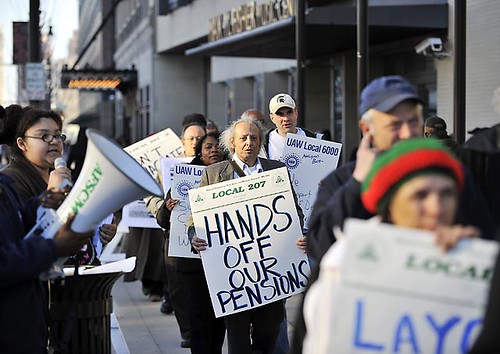
Workers and community activists took to the streets on March 23, 2010 in opposition to the plans to close schools and reconfigure the city under corporate direction. The Kresge and Skillman Foundations are designing the plans over local objection., a photo by Pan-African News Wire File Photos on Flickr.
June 24, 2013 at 1:00 am
Ala. bankruptcy highlights challenges facing Detroit
David Shepardson
Detroit News Washington Bureau
Washington — The nation’s largest municipal bankruptcy may be nearing a conclusion after 18 months in court and the Alabama county offers some lessons for Detroit if it is forced to file for Chapter 9 restructuring in the coming months.
Jefferson County filed for bankruptcy in November 2011, citing more than $4 billion in debt, largely from a troubled sewer project. It also has been hit with the loss of the source of 25 percent of its tax revenue and a public corruption scandal surrounding the sewer project. The county has sold off assets, continued to have layoffs since filing and closed a money-losing county-hospital. Under a deal announced this month, the county will spend the next 40 years repaying much of the debt it owes — though creditors agreed to forgive a significant chunk.
The filing topped the prior largest U.S. municipal bankruptcy — the 1994 filing of Orange County, Calif., with $1.4 billion in debt. But a Detroit filing would top Jefferson County multiplied by three to five times.
Under the proposed deal with three major creditors approved by the Jefferson County commission earlier this month, creditors would get about 80 cents on the dollar — far more than Detroit’s emergency manager is proposing to pay Detroit’s creditors. The deal is expected to be filed by June 30 and take effect by November. It still needs approval of a bankruptcy judge. The commission must still approve deals with other creditors.
The Jefferson County case shows Detroit may face major bills for decades as it refinances much of its debt and tough choices about what city assets to sell. Even local governments that win key procedural victories early in bankruptcy can still face 18 months or more in bankruptcy amid creditor challenges and complex negotiations.
Jefferson County, with 660,000 residents including Birmingham, is 55 percent white and 42 percent African-American. It spent several years trying to avoid bankruptcy, making rounds of painful budget cuts, furloughs and layoffs.
In February, Jefferson County voted to sell a county-owned nursing home to raise $11 million.The Birmingham News reported last week that the county is now considering 30 percent increases in sewer rates.
Jefferson County will sell $1.9 billion in new debt called capital appreciation bonds that the Wall Street Journal said will require the county to ultimately pay $6.9 billion over four decades of financing.
The bonds are criticized by many officials as too expensive and the Michigan legislature in 1994 banned the use of the bonds for new school construction, citing the high overall costs.
Robert Brooks, a finance professor at the University of Alabama, said he’s not convinced that Jefferson County will be able to handle the debt repayment schedule after it exits under the current terms.
“The idea is that optimistically we are going to grow into our ability to pay this back. We could be back in bankruptcy in four to five years,” Brooks said. “ When Detroit was going through this, I’m sure someone was telling them how easy it would be to repay these obligations ... The real issue is people leading Detroit have to make hard decisions, not political ones,” Brooks said.
Kenneth Klee, a lawyer for Jefferson County, said Detroit’s first big hurdle if it files for bankruptcy is quickly setting an “eligibility hearing.” Any city or county filing for bankruptcy must establish it is eligible to file for bankruptcy and creditors can try to drag out the process.
Klee said Detroit needs to be prepared for an expensive bankruptcy. “They are going to need a war chest and resources,” he said. In Jefferson County, he said the costs would be about $1 million a month, but could be much higher for Detroit.
“The creditors will try to bleed the debtors.” Setting a fast hearing also improves morale for the city, he said.
After cutting $90 million over three years, Stockton, Calif., filed for bankruptcy in June 2012 after it was faced with $26 million in deficits. In the run-up, Stockton, the largest U.S. city to file for court protection, faced 22 percent unemployment while property values fell 50 percent; median home prices fell from $422,000 in 2006 to $140,000 in 2012; the city cut its workforce 25 percent, including 20 percent of police and 30 percent of firefighters.
Last week, Stockton officials unveiled a plan to hike the sales tax to 9 percent from the current 8.25 percent to raise money to pay for more police and raise money to exit bankruptcy. If approved by the city council Tuesday, it would go to the voters in November.
Douglas Bernstein, a Plunkett Cooney managing partner and bankruptcy attorney, says no one municipal bankruptcy case mirrors what Detroit might face. Jefferson County has a stronger “revenue stream and they’re not running a city,” Bernstein said.
“One of the huge disadvantages is you’ve never had a true city anywhere near the size of Detroit filing for Chapter 9.”
Klee said Detroit — like Jefferson County — will need to get “community buy-in” for a bankruptcy restructuring. Klee, who was one of the lawyers that made a pitch to represent Detroit in restructuring efforts, thinks the city has no choice but to file for bankruptcy and will need state help.
“The state is going to have to convince the surrounding counties (or cities) to annex some of the land and to take over the real estate in exchange for transfer payments,” Klee said.
From The Detroit News: http://www.detroitnews.com/article/20130624/METRO01/306240016#ixzz2X6tciRXY
No comments:
Post a Comment